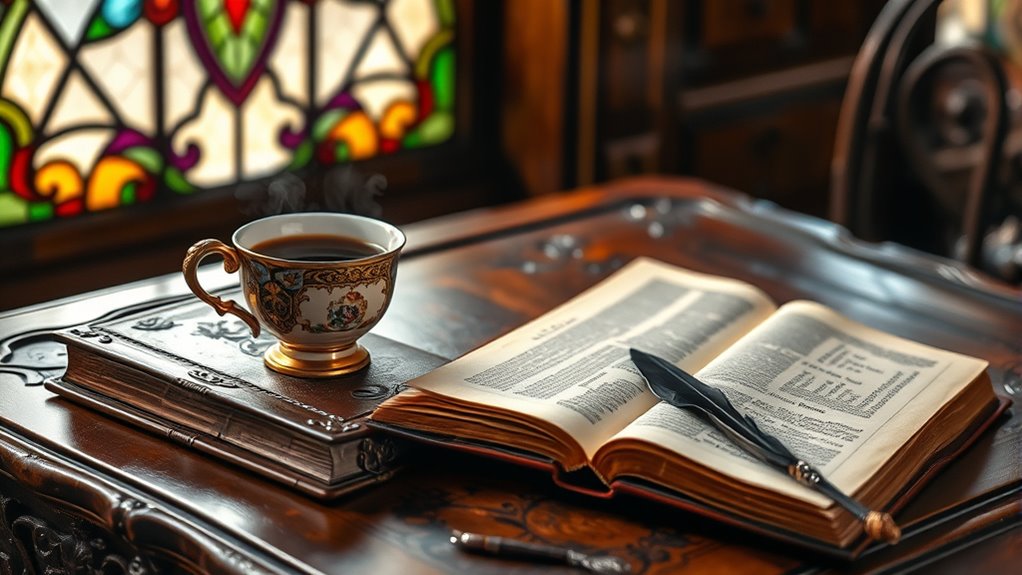In classic literature, coffee often symbolizes daily routines, moments of reflection, or social bonds. It highlights characters’ emotional states, societal status, and cultural aspirations. Writers like Eliot and Trollope use coffee scenes to reveal inner thoughts or social norms, making the beverage a powerful literary device. As you explore further, you’ll discover how coffee captures the complexities of human experience and enriches storytelling with vivid imagery and deeper meaning.
Key Takeaways
- Coffee symbolizes daily routines and societal status in classic literature, often reflecting characters’ emotional states.
- Writers like T.S. Eliot and Trollope use coffee scenes to depict leisure, introspection, and social norms.
- Coffee rituals reveal character traits and cultural values, often signifying success or stability in narratives.
- Coffee scenes act as moments of reflection, calm, or decision, embodying human experience and emotional complexity.
- Vivid imagery of coffee enhances scene realism, emphasizing its role as a symbol of aspiration, comfort, and daily life.

Have you ever noticed how coffee often appears in literature as more than just a beverage? It’s frequently used as a symbol that captures the rhythm of daily life, the comfort of routine, and the social bonds that tie characters together. A simple cup of coffee becomes a powerful literary device, revealing much about a character’s emotional state or societal position. Whether it’s a steaming morning coffee in New York or a quiet moment over black coffee, these scenes evoke a sense of familiarity and reflection that resonates with readers.
Next time you read about characters engaging with coffee, pay attention to how it signifies more than just taste; it reflects their inner worlds, their routines, and their aspirations.
Notice how coffee in stories reveals characters’ inner worlds, routines, and unspoken aspirations beyond mere taste.
In classic literature, coffee often symbolizes the mundane yet meaningful aspects of life. Writers like T.S. Eliot and Anthony Trollope used coffee as a marker of leisure and introspection. Eliot’s poetry, for example, frequently portrays moments where a simple cup of coffee becomes a pause—a space for thought amid chaos.
Trollope’s characters often find themselves at cafes or homes enjoying morning coffee, which underscores their social norms and personal stability. These scenes aren’t just about the act of drinking; they reveal the characters’ emotional states—restlessness, contemplation, or camaraderie. Coffee acts as a mirror, reflecting moments of passage, decision, or calm.
In literature, coffee rituals are often employed as literary devices to expose traits or societal values. A character’s choice of black coffee versus a sugared latte can hint at their personality—practical, no-nonsense, or indulgent.
The act of sharing a cup of coffee can symbolize camaraderie, trust, or even conflict. For example, in stories set in New York or other bustling cities, the morning coffee often signifies the rush to keep up with the American dream. It’s the fuel that propels characters through their hectic routines, embodying the pursuit of success amid the chaos.
Additionally, the use of color accuracy and visual detail in descriptions of coffee scenes enriches the imagery, making these moments more vivid and relatable for readers. These scenes become more than just about caffeine; they mirror the broader cultural aspirations and the daily grind. Ultimately, coffee’s presence in literature underscores its role as a symbol of daily life, intellectual pursuit, and emotional comfort.
It’s a quiet yet powerful motif that captures the complexities of human experience. Whether as a moment of solitude or social connection, coffee anchors characters in their worlds.
Next time you encounter a literary scene involving coffee, recognize it as a reflection of the universal desire for stability, reflection, and hope—elements that make the coffee cup a timeless symbol in storytelling.
Frequently Asked Questions
What Does Coffee Symbolize in Literature?
When you ask what coffee symbolizes in literature, you’re exploring its deeper meanings beyond just a beverage. Coffee often represents routines, comfort, and stability that ground characters’ lives.
It can also highlight moments of reflection or internal struggle, serving as a catalyst for thought.
Additionally, coffee might symbolize social connection or fleeting happiness, revealing characters’ desires for warmth, inspiration, or escape from societal pressures.
What Is a Famous Book Quote About Coffee?
You’re asking for a famous book quote about coffee. One well-known line is from T.S. Eliot’s “The Love Song of J. Alfred Prufrock”: “measured out my life with coffee spoons.”
This quote captures how coffee symbolizes routine and daily life’s mundane moments. It’s a powerful reminder that coffee often represents more than just a beverage; it reflects habits, social rituals, and even deeper themes like reflection and monotony.
What Is Coffee House in English Literature?
A coffeehouse in English literature is a social space where characters gather to discuss ideas, politics, and culture. You see these venues as lively hubs of debate and learning, often representing intellectual and social mobility.
They symbolize places where conversations spark innovation, influence journalism, and shape society. As you read, you’ll notice authors use coffeehouses to depict vibrant scenes of interaction, reflecting their importance in shaping ideas and literature.
Did They Have Coffee in the 1920S?
Yes, they’d coffee in the 1920s. You could find it in bustling Parisian cafés like Café de Flore and Les Deux Magots, where writers and artists gathered.
While instant coffee was emerging, brewed coffee from beans remained popular among the literati. You’d enjoy leisurely drinks and lively conversations, as coffee culture became a key part of the era’s social and intellectual life.
Conclusion
As you explore classic literature, you realize coffee isn’t just a beverage—it’s a symbol of social change, creativity, and introspection. Whether it’s fueling writers or marking pivotal moments, coffee’s presence enriches the stories and characters you admire. Next time you sip your cup, remember its rich history woven into the pages of timeless works. Coffee connects you to a tradition of thought, passion, and life’s simple pleasures that continue to inspire.








